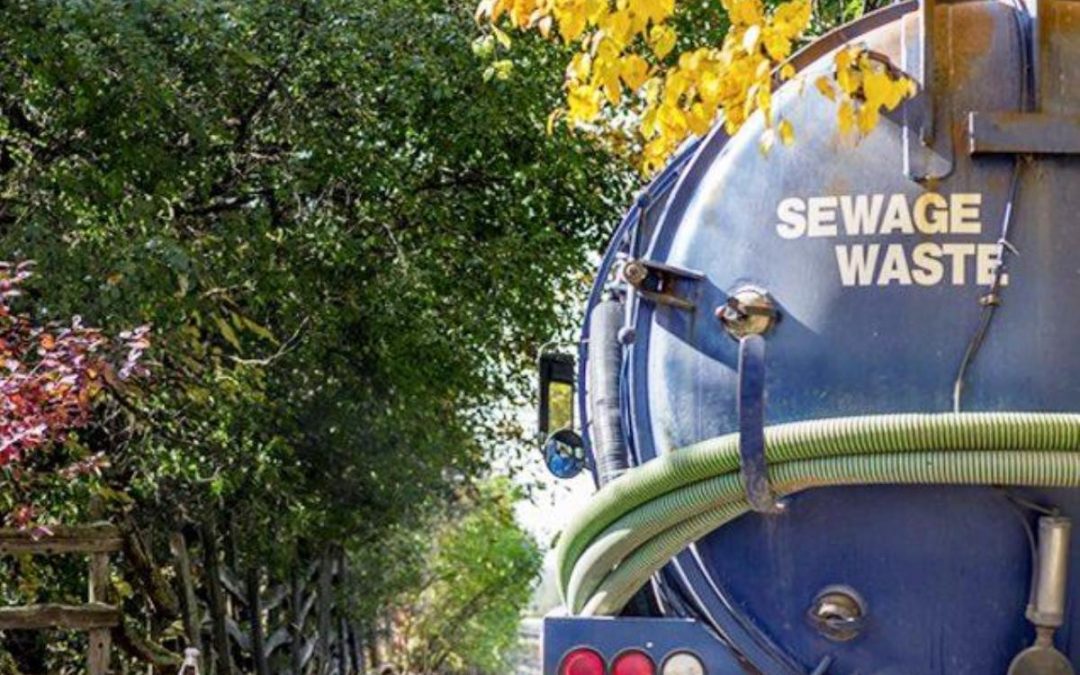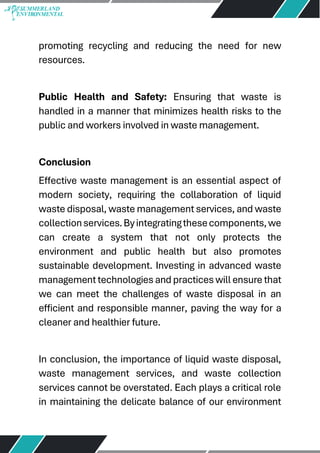Reclaim Waste Things To Know Before You Get This
Reclaim Waste Things To Know Before You Get This
Blog Article
8 Easy Facts About Reclaim Waste Shown
Table of ContentsNot known Details About Reclaim Waste The Only Guide to Reclaim WasteNot known Incorrect Statements About Reclaim Waste Reclaim Waste for Beginners6 Simple Techniques For Reclaim Waste
Discover the kinds, incidents, and forms of liquid waste. Domestic sewer waste refers to the waste and products from a domestic septic system. This kind of waste is produced by people in houses, schools, and various other buildings. This only consists of septic systems that have a drain field. The proper management and disposal of residential sewage waste require fluid waste to be moved to a sewer treatment plant where the appropriate methods and tools are put on detoxify and dispose of waste.
Commercial waste often consists of prospective hazards, such as combustible products or a mix of liquid and solid waste products, and needs an advanced and detailed disposal process. The disposal of business waste generally involves the purification of waste before transportation to guarantee secure and proper disposal. Industrial waste is created from results and drainage of industrial procedures and production.
This type of waste can not make use of the very same sewage administration transport or procedures as septic or business fluids. The industrial waste monitoring procedure calls for the examination and testing of liquid waste before it goes through the disposal procedure (liquid waste removal). Drainage waste is the liquid waste that comes from runoff and excess stormwater in highly inhabited areas or cities
Overflow waste can trigger contamination and flooding if not managed correctly. Discover extra regarding sewer cleaning and waste management. Making certain correct waste administration can protect against calamities and lower ecological damage. Both individuals in property setups and specialists in industrial or manufacturing sectors can take advantage of comprehending the procedures and policies of liquid waste monitoring.
The Buzz on Reclaim Waste
Call PROS Providers today to discover our waste administration and disposal solutions and the correct ways to look after the liquid waste you generate.
(https://triberr.com/reclaimwaste1)This so-called 'wastewater' is not just an important source yet, after treatment, will be released to our land, waterways or the ocean. Utilized water from toilets, showers, bathrooms, kitchen area sinks, laundries and commercial procedures is recognized as wastewater.

water used to cool down equipment or tidy plant and devices). Stormwater, a kind of wastewater, is runoff that moves from agricultural and city areas such as roofing systems, parks, yards, roads, paths and seamless gutters into stormwater drains, after rain. Stormwater moves unattended straight to neighborhood creeks or rivers, at some point getting to the sea.
The Best Strategy To Use For Reclaim Waste
In Queensland, a lot of wastewater is treated at sewer treatment plants. Wastewater is transported from residential or commercial websites through a system of drains and pump stations, understood as sewage reticulation, to a sewage treatment plant.
The Division of Natural Resources advises city governments regarding handling, operating and keeping sewerage systems and treatment plants. In unsewered locations, city governments may require owners to set up specific or house sewer treatment systems to treat domestic wastewater from commodes, kitchens, bathrooms and washings. The Department of Natural Resources authorizes using household systems when they are shown to be reliable.
The majority of stormwater gets no treatment. In some brand-new communities, therapy of some stormwater to get rid of clutter, sand and crushed rock has started utilizing gross pollutant traps. Wastewater therapy occurs in 4 phases: Gets rid of strong issue. Bigger solids, such as plastics and various other items incorrectly discharged to sewage systems, are eliminated when wastewater is travelled through screens.
Wastewater then moves into big tanks where solids clear up and are removed as sludge. Oil and scum are skimmed from the surface area. Utilizes small living microorganisms called micro-organisms to damage down and remove continuing to be dissolved wastes and great fragments. Micro-organisms and wastes are incorporated in the sludge. Eliminates nitrogen and phosphorus nutrients that could trigger algal blossoms in our waterways visit our website and endanger water life.
Little Known Questions About Reclaim Waste.
Nutrient removal is not available at all sewage therapy plants due to the fact that it requires pricey specialized tools. Clear fluid effluent produced after therapy may still consist of disease-causing micro-organisms - industrial wastewater treatment.

Most wastewater moves into the sewage system. Under the Act, neighborhood federal governments provide authorizations and licences for ecologically appropriate activities (Ages) entailing wastewater launches that might have a neighborhood impact.
What Does Reclaim Waste Do?
Otherwise, samples are considered laboratory analysis. Usually numerous tests are required to develop the degrees of each of the various contaminants such as oils, hefty steels and chemicals in water. Surveillance offers accurate details regarding water high quality and can verify that licence problems are being satisfied. The info obtained with tracking provides the basis for making water high quality decisions.
Report this page